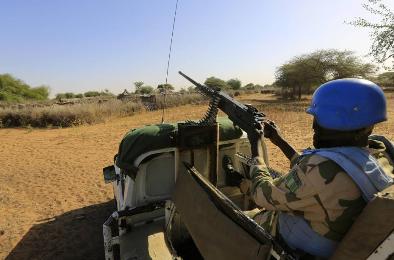Sudan economic slump blamed for increase in Darfur tribal tensions: report
January 30, 2014 (KHARTOUM) – Sudan’s economic slump over the past two years has led to an increase in inter-communal conflict and banditry in the western Darfur region, as competition over resources and minerals intensified, according to the UN secretary-general’s latest quarterly report to the UN Security Council(UNSC).

“Intermittent clashes between government and armed movement forces, resource-based inter-communal fighting and widespread banditry continued to place civilians at serious risk of physical violence”, the report, which was presented to the UNSC earlier this month, said.
Competition over access to arable land, as well as lucrative minerals and hydrocarbons, including gold and oil, was also contributing to increased tensions between communities, as well as delays in salary payments to paramilitary forces.
This has led to members seeking to exploit alternative sources of revenue to sustain their livelihoods and had eroded the authorities’ control over the forces, the report found.
Inter-communal violence in the region also has its roots in pre-existing factors such as weak rule of law, absence of state administrations in rural areas and traditional conflict resolution mechanisms, as well as the prevalence of arms and armed groups and limited opportunities for young people.
Fighting between tribal groups over land access, natural resources and community rivalries has continued to spark retaliatory attacks and has displaced thousands of people last year.
Seven UNAMID peacekeepers were killed in Darfur between October and December, bringing the death toll in 2013 to 16.
According to the report, threats to the safety and security of UNAMID and humanitarian personnel, particularly to armed attacks, carjackings and robberies remains a serious concern.
The report also noted an escalation in clashes between government troops and armed movements across the region.
In one particularly disturbing incident on 29 November, a Sudanese military aircraft conducting surveillance on rebel movements in Northern Darfur fired on a convoy of civilian vehicles, killing 10 displaced people, including two women and a child.
CONFLICT RESOLUTION
In light of ongoing tribal tensions, UNAMID has stepped up its efforts to support community-level conflict resolution. The agency has also conducted a number of conferences across Darfur aimed at addressing the root causes of inter-communal conflict.
Recommendations made by conference participants included more resources for traditional mediators and reconciliation efforts, strengthening the rule of law, boosting the involvement of women in reconciliation processes, and the establishment of a mechanism to monitor potential breaches of local ceasefire agreements, and have been presented to relevant authorities for consideration.
The report also acknowledged that progress on the implementation of the majority of the provisions of the Doha Document for Peace (DDPD) has continued to lag far behind the implementation timeline.
There are also concerns that to date, none of the $1 billion pledged at a donor conference in April 2013 has been delivered.
(ST)
